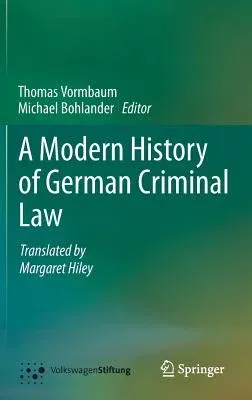Thomas Vormbaum
(Author)A Modern History of German Criminal Law (2014)Hardcover - 2014, 14 October 2013

Qty
1
Turbo
Ships in 2 - 3 days
In Stock
Free Delivery
Cash on Delivery
15 Days
Free Returns
Secure Checkout

Print Length
304 pages
Language
English
Publisher
Springer
Date Published
14 Oct 2013
ISBN-10
3642372724
ISBN-13
9783642372728
Description
Product Details
Author:
Book Edition:
2014
Book Format:
Hardcover
Country of Origin:
NL
Date Published:
14 October 2013
Dimensions:
23.39 x
15.6 x
1.91 cm
Genre:
Law Studies
ISBN-10:
3642372724
ISBN-13:
9783642372728
Language:
English
Location:
Berlin, Heidelberg
Pages:
304
Publisher:
Weight:
639.56 gm